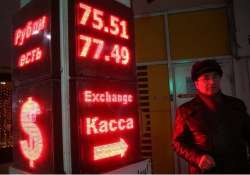Russian currency crisis poses Putin his biggest challenge
Moscow: He crushed Chechnya's rebellion, pushed back Russia's frontiers and restored the pride of a nation humiliated by the demise of the Soviet Union.But 15 years after he came to power Vladimir Putin's faces his

Moscow: He crushed Chechnya's rebellion, pushed back Russia's frontiers and restored the pride of a nation humiliated by the demise of the Soviet Union.
But 15 years after he came to power Vladimir Putin's faces his biggest challenge yet: how to manage the worst monetary crisis of his era.
Both as president and prime minister the former KGB spy always managed to stay one step ahead of events. His skill for outmanoeuvring rivals emboldened him to take major gambles, the most recent being Russia's annexation of the Crimean peninsula in March -- a move that blindsided Ukraine.
But the judo black belt, who loves nothing more than destabilising his adversaries by exploiting their weaknesses, has been caught off guard by the collapse of the ruble.
Inflation has soared, companies with loans in foreign currency are threatened with bankrupcy, major infrastructure projects have skidded to a halt and the banking sector is reeling.
The crisis, triggered by Western sanctions against Moscow over Ukraine compounded by plummeting petrol prices and consumer and market scepticism, has exposed Russia's weaknesses.
With Putin having built himself up as the state's sole indispensible figure, observers are now asking whether a weaker Russia will also mean a weaker Putin.
- 'Kremlin has no strategy' -
"There's not much he can do," said Alexander Konovalov, president of the Institute for Strategic Assessments.
Using up the hundreds of billions of dollars in reserves Moscow had amassed since the 2000s "won't be enough to hold on for long", Konovalov said. "People are starting to grasp that the Kremlin has no strategy and that it's not in a position to manage (the crisis)."
Economics has never been Vladimir Putin's forte. Happy to lecture when it comes to 10th century Russia or the great battles of World War II, he is not wedded to any particular school of thought.
Putin is evasive about his preferences -- state capitalism or liberalism, interventionism or laissez-faire? -- unnerving some investors.
Aware that he has little room to manoeuvre, he is leaving it to Prime Minister Dmitry Medvedev to declare that the ruble is "undervalued" and that the country's currency reserves will be sufficient to see it through.
But Putin will not be able to avoid the subject when he comes face-to-face with hundreds of Russian and foreign journalists at a major press conference scheduled for Thursday.
Nikolai Petrov, a respected political analyst at the Higher School of Economics in Moscow, said Putin could use the occasion to "publicly admonish" government officials for their handling of the crisis.
Beyond that, "the government and central bank have to hold out until the end of the year", Petrov said.
"After the New Year, the ruble will stabilise. But a spike in inflation is inevitable. The question is to know how the government will try to regulate it."
- Tilting at the West -
Analyst Alexei Makarkin outlined another course of action.
"Try to have at least some of the Western sanctions lifted and to speak with our Western rivals," he suggested.
But securing a rollback of the sanctions would require Putin to give commitments to Kiev and the West on a disengagement from Ukraine.
Another possibility would be to hold the West responsible for Russia's travails.
Recent remarks by Foreign Minister Sergei Lavrov suggesting a Western agenda to topple Putin tended in that direction.
Lavrov said there were "serious reasons" to believe that the main aim of the Western sanctions on Russia was to bring about regime change.